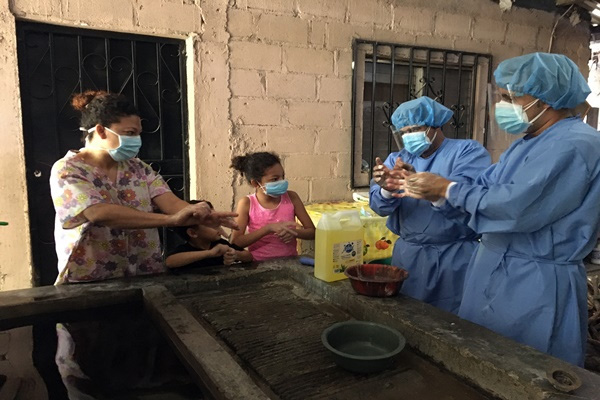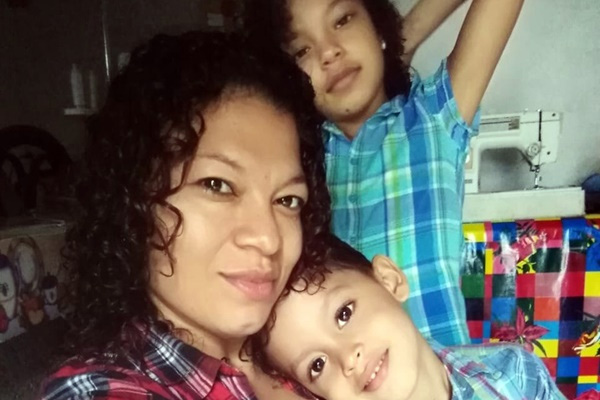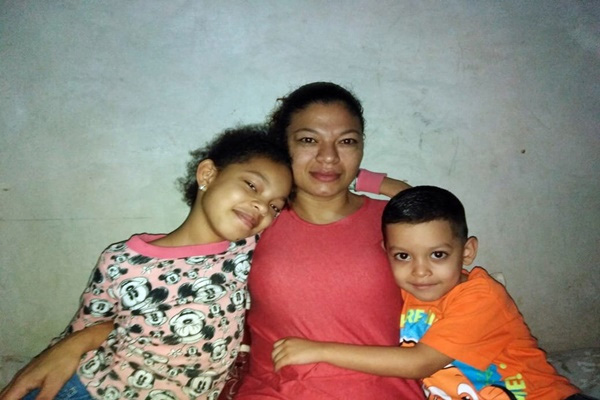NPH Honduras Creates Rapid Response Team
Margen, a single mother from La Paz, survived on work in the informal economy. However, when the COVID-19 pandemic hit, she contracted the virus, leaving her reliant on support from NPH.
 Keyla Suazo
Keyla Suazo
Communications Officer, NPH Honduras
December 30, 2020
…
Everyone knows a single mother. For her children, she is a hero; for society, she is the bravest; however, just a few people talk about the challenges they face every day, especially during the COVID-19 pandemic. According to the National Institute of Statistics, 33.5% of families in Honduras are headed by a single mother, many of whom struggle to provide for their children. But what about single mothers in rural areas?
According to World Bank, 60.1% of people living in rural areas face high levels of poverty and COVID-19 has further hurt their local economies, especially the informal sector which before the pandemic paid low wages under unstable employment contracts. In the report Social and economic impact of the COVID-19 and policy options in Honduras by the United Nations Development Programme (UNDP), it found that up to 82.4% of the nation’s workforce is made up of workers in the informal sector. The national quarantine restrictions left businesses cutting back on staff and people unable to leave their homes, making it more difficult to make a living and meet the needs of their children.
This has been the case for Margen Cerrato, a 34-year-old woman and Hermana Mayor (Elder Sister) of NPH Honduras, who lived at Rancho Sante Fe for 10 years between 1998 and 2008. “I remember coming to my beloved NPH home when I was 12-years-old. I am the oldest of seven siblings. We never received help from my dad, and my mom died from stomach cancer in 1997, so we joined the NPH family,” says Margen.
They grew up together in the mining town of Agalteca, just 18 miles from Rancho Santa Fe, and 33 miles north of the Honduran capital, Tegucigalpa. Margen looks back fondly on the years living with her NPH family, as well as feeling gratitude for the support they all received.
“It wasn’t just my siblings and me, but also for my grandparents. They lived alone and no longer had the strength to provide for themselves, let alone seven children. Fortunately, they received financial help and food baskets through the NPH social work department,” she adds. “I love everything about NPH. It is like living in a normal home, but with a lot more siblings: possibly the biggest family you could ever know!”
When she turned 22, she felt ready to leave NPH and support her siblings by finding a job. Thanks to the training and education Margen received at NPH Honduras, she found various work opportunities as a seamstress and continued her studies in tailoring at the National Pedagogical University. She had a first taste of sewing through the vocational program at Rancho Santa Fe, and found she was talented and enjoyed the process of making and mending clothes.
“I was asked a lot, ‘where did you learn to sew?’ and I would proudly answer ‘at my beloved NPH home!’ and they would always look impressed, especially when they saw my range of skills and the quality of my work,” adds Margen, smiling.
Her talents were noticed and she was soon accepted as a student at the best sewing school in the country in La Paz, a province in the southwestern area of Honduras close to the border with El Salvador with a population of over 200,000 people. Life, however, intervened. She fell in love, married, and left her studies to become a wife and mother to two children: Esperanza, now age 10, and Tomas, age 5. Unfortunately, the marriage did not last. Margen left her husband shortly after the birth of her second child.
Currently, the family of three lives in a small home in a village named Yarumela located in the La Paz department, a 70-mile drive from Rancho Santa Fe, with the main economy being banana cultivation and coffee production. Two of her sisters live close by, one sibling lives in México and the other four live in other cities throughout the country. Unfortunately, poverty and the COVID-19 pandemic do not respect borders, language, race, or the love of a family.
“The quarantine impacted us in a bad way. I lived off sewing, but the pandemic made all my work projects fall apart, leaving me without a living. It was hard, because I had to pay bills and care for my children’s needs. Through a friend, I began to sell fried chicken with banana chips, a typical meal in Honduras. While I worked 4 to 9 in the evening, my daughter took care of her brother. I earned US$4 a day, which was very difficult to live on, but things went from bad to worse when I got COVID-19,” remembers Margen.
Although she self-isolated in her bedroom, her children became infected. Initially, she didn’t know what to do. Local clinics lacked resources and had long lines, and she was too ill to leave the house. The NPH family never strays too far from her mind, however, and in her moment of desperation, they came to Margen’s side through the new medical Rapid Response Team.
The Rapid Response Team is a temporary program set up by NPH Honduras consisting of a mobile brigade capable of responding to COVID-19 outbreaks within NPH homes and local communities. For the last six months, the objective of the program is to support the most vulnerable populations during this global emergency. “Through an educational strategy that aims at prevention, we emphasize the use of face masks and proper handwashing, in addition to rapid tests, medication, and other laboratory tests, we will be able to help our people,” says Dr, Marta Baca, NPH Regional Coordinator of Medical Services.
“Our main focus has been the central region of Honduras, but considering that Margen met our program criteria by being a single mother, we went to Yarumela, which is almost three hours from the main NPH home. As part of the protocol, we interviewed and visited her,” adds Dr. Camila Koehler, coordinator of the Rapid Response Team.
The medical team noted that Margen was suffering from emotional distress and had a high fever and headaches, but her body was resisting a bacterial superinfection. In addition to the COVID-19 test, the medical team carried out laboratory tests that gave the doctors clear signals of the type of attention she should receive. Fortunately, the children’s symptoms were not as debilitating as their mother’s.
“Despite leaving Rancho Santa Fe many years ago, they still keep me in mind. I appreciate not only the medical attention, but also listening and giving advice. When they found out about my economic situation, they gave me financial support to help alleviate my problems. I know if I call, they will respond,” adds Margen.
“The coronavirus is a new disease that more than steals people’s health; it impacts livelihoods and morale. For us, it is very important to pay attention to every detail to be able to help them through different assistance programs. Our objective at NPH has been always to stay close to the needs of the people and offer support, even more so when it is a member of the family,” explains Doctor Camila.
Margen says that she dreams of earning enough money so she can become an NPH donor one day. “If I win the lottery, the first thing I’ll do is donate to the home that gave me a childhood. The children there are my family, even if we do not know each other. I really believe in NPH!’’ concludes Margen.
Photo above: The Rapid Response Team visits Margen an hermana mayor from NPH Honduras, and her children in Yarumela, La Paz. Photos below: Margen, pictured with her children, worked as a seamstress before the pandemic. They are recovering from recent setbacks, having received essential support at the right time from the NPH Honduras Rapid Response Team.
Related Information
• NPH Honduras
• How Your Help Makes an Impact at NPH











